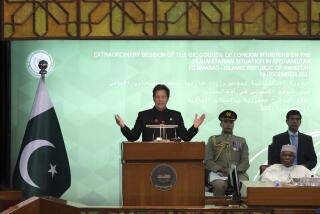Exiles Support Lead Role for Ex-King in Post-Taliban Era
- Share via
PESHAWAR, Pakistan — Expressing concern that a victory by the opposition Northern Alliance would bring “a new phase of bloodshed and disorder” to Afghanistan, a conference of Afghan elders and former resistance commanders Thursday called on the country’s former king to take the lead in forming a post-Taliban government.
The gathering here of 800 mostly Pakistani-based Afghan political and religious leaders was boycotted by the Northern Alliance and other key groups. Even the former king’s aides shunned the conference, with one charging that the meeting had been manipulated by Pakistani intelligence.
But whether the former monarch wanted it, the meeting here represented the first significant public endorsement of the 87-year-old Mohammad Zaher Shah as the lead player in any post-Taliban reconstruction.
“We hope the former king will play an effective role, according to his moderate and balanced policy, to put an end to this crisis,” the Assembly for Peace and National Unity of Afghanistan stated in a resolution approved by voice vote.
Also hoping to play an important role in the post-Taliban order was Pir Sayed Ahmad Gailani, a relative of Zaher Shah who presided regally over the Peshawar meeting wearing a gold-filigreed cloak and sitting in a throne-like chair.
Last week, Gailani traveled to Rome, where Zaher Shah has lived since being deposed in 1973, to lobby for a place on the Supreme Council of National Unity, the body expected to be named jointly by the former king and the Northern Alliance, and for a leadership position in the interim government that it would create.
“We gave him a place on the Supreme Council, but that wasn’t good enough for him,” said an aide to Zaher Shah who requested anonymity. “He wanted to be at the top of the list. But that’s up to the people of Afghanistan. It’s not up to his majesty, and it’s not up to Pakistan.”
Publicly, the former king’s aides welcomed the endorsement from Peshawar and said they didn’t believe that Gailani was trying to create a rival authority. But Zaher Shah declined to send a representative to the Peshawar meeting because, one aide said privately, it appeared to have been staged by Pakistan and its ISI intelligence service as a means of shaping the makeup of the Supreme Council.
Pakistani officials deny playing any role in the Gailani meeting other than allowing it to occur after years of banning Afghan political rallies on its territory. “Our expectations are low,” a senior Pakistani official said this week.
But the meeting was attended by officers in the Pakistani Foreign Ministry, and the resolution adopted by the attendees Thursday praised both Pakistan and Iran--”two Muslim brothers and neighboring countries”--for their treatment of Afghan refugees.
“We look up to the assistance extended by the people and government of Pakistan with respect and honor,” the resolution stated.
Though endorsing the idea of similar meetings in the future, the resolution urged that they be held in Peshawar “because most of the Afghans in exile live here and maintain close and permanent connection with the country.” This also reflected a Pakistani concern that other nations may play too great a role in a country with which Pakistan shares a 1,500-mile border.
Significantly, the conference concluded with strong criticism of militant religious organizations in Pakistan that support the Taliban regime and have been vocal in their criticism of the Peshawar peace conference.
“We thank the religious circles in Pakistan for their support during the Afghan war,” concluding speaker Azi Amin Waqad said, referring to the 1979-89 conflict with Soviet occupation forces. “But I don’t know why they are opposing this peace conference.”
Waqad, a former senior leader of a moujahedeen group that received substantial backing from the CIA and Pakistani intelligence agencies during the war against the Soviets, is known to be close to Pakistani authorities.
His comments coincided with a crackdown on extremist religious groups by Pakistani President Gen. Pervez Musharraf.
When Gailani proposed the meeting several weeks ago with the tacit approval of the Pakistani government, the idea received an enthusiastic response from the exile community. Although he made it clear that he had nothing to do with organizing the conference, Zaher Shah said he would gladly accept its endorsement.
But as the conference date approached, several key commanders, including Quetta, Pakistan-based Gul Agha Shirzai, a former governor of Kandahar province, and Abdul Haq, a respected Peshawar-based moujahedeen leader, dropped out. Two prominent Peshawar commanders, Haji Mohammed Zaman and Mohammed Zarin, attended the first day of the conference Wednesday but failed to show up for the meeting’s conclusion.
Several of these leaders are now said to be preparing conferences of their own.
The squabbles and internecine feuds underlined the fractious nature of the Afghan political world and the difficulty involved in trying to construct a unified alternative to the Taliban, which remains intact despite more than two weeks of U.S.-led heavy bombing of its positions.
“There is still no coordination among all the people who are working for the king,” said Rahimullah Yusufzai, a Pakistani journalist and expert on Afghanistan. “We have not yet seen a joint rally in support of the king.”
Despite its many shortcomings, many of those attending the two-day meeting left content that they had done something to bring peace to Afghanistan.
Malik Mirza Mohammed Arab, 57, said he had traveled to the conference from his home in Jalalabad in eastern Afghanistan.
“We sent a message to motivate our former king,” said Arab, “pressuring him to go back to Afghanistan, where he is loved so much.”
*
Tempest reported from Peshawar and Boudreaux from Rome.
More to Read
Sign up for Essential California
The most important California stories and recommendations in your inbox every morning.
You may occasionally receive promotional content from the Los Angeles Times.










